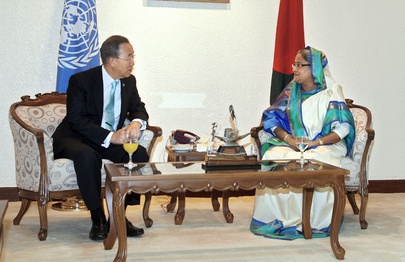
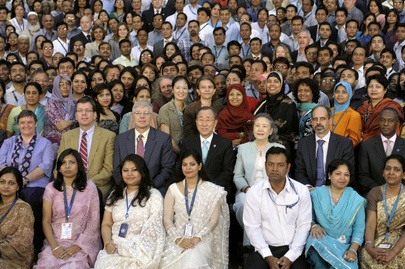
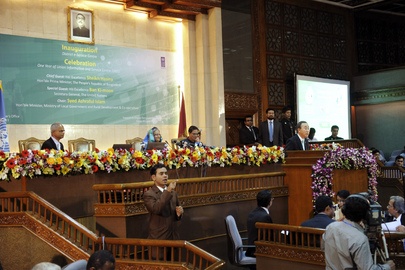
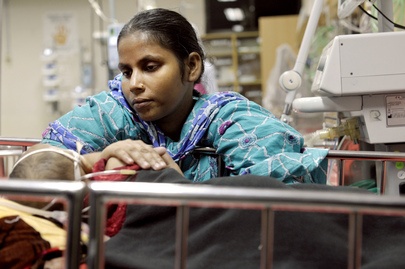
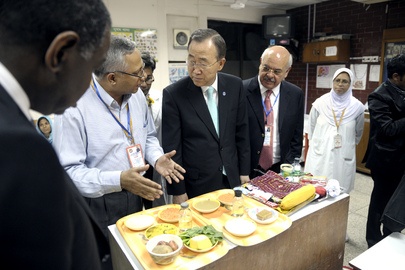
“The lesson is clear: natural hazards need not cause human catastrophe. There are many cost-effective remedies that communities and countries can take to reduce the impact of extreme weather events,” according to UNSG Ban Ki-moon visiting Bangladesh. “Because of its adaption and preparedness measures, the people of Bangladesh are much safer today,” Mr. Ban said in remarks to the second Climate Vulnerable Forum, which he opened in Dhaka with Prime Minister Sheikh Hasina.(Top Photo with UNSG Ban).
Climate change is the single most important challenge the world faces and Bangladesh is a country that is all too familiar with the impact of extreme weather events, and the Mr. Ban stressed its global leader role in disaster risk reduction. In 1991, a cyclone killed more than 140,000 people. Then in 2007, when another major cyclone struck, many volunteers helped move thousands of people out of the disaster area and probably saving countless lives - death toll from that tragedy was 4,000.
--2nd Photo - UNSG Ban with UN Staff based in Bangladesh.
--3rd Photo - UNSG Attends Celebration of Bangladeshi e-Governance Initiative.
--4th Photo - Mother and Child at Disease Research Centre in Dhakavisted by UNSG - A woman and her infant child at the International Centre for Diarrhoeal Disease Research in Dhaka, Bangladesh.
--5th Photo - UNSG visits the International Centre for Diarrhoeal Disease Research in Dhaka, Bangladesh, which includes a Nutrition Rehabilitation Ward.
Weather Extreme Becoming More Extreme!
Mr. Ban noted that this is a key message of a special report being released this week by the Intergovernmental Panel on Climate Change (IPCC), on Managing the Risks of Extreme Events and Disasters. “The severity of cyclones, floods and other consequences of climate change are increasing. Strong disaster risk reduction and adaptation policies will be increasingly essential.”See Film Report: Extreme Weather: Floods/Droughts” -
diplomaticallyincorrect.org/films/movie/extreme-weatherfloods-droughts/24068 )
No Country Immune from Climate Change:
Bangladesh is vulnerable. “You are on the front line of climate change.” At the same time, the UNSG noted that every country is affected, and there is no country which is safe. “Climate change is a global problem requiring a global solution. It requires urgent efforts on the part of every country, every citizen, every business community and civil society. We need scaled-up national, international and regional efforts.” See Film Report: “Natural Disasters 2010-Deadliest?” -
diplomaticallyincorrect.org/films/movie/natural-disasters2010-deadliest/24489).
The UNSG commended the lead taken by Bangladesh to follow “a pro-development, low-carbon path,” noting in particular its establishment of a climate change trust fund and a resilience fund. “In this time of global economic uncertainty, let your commitment to green growth be an inspiration to more developed countries – the major emitters.” See Film Report: “Climate Change & Urbanization Dangerous Combo” -
diplomaticallyincorrect.org/films/movie/climate-change-urbanizationdangerous-combo/27044 ).
“Climate Vulnerable Forum”:
The Secretary-General said he will count on the members of the Climate Vulnerable Forum to arrive at the UN climate change conference that will open in Durban, South Africa, later this month, with a “strong and united” voice. “Durban must complete what was agreed last year in Cancún,” he said, referring to the previous UN climate change conference. Governments must ensure that the adaptation framework and technology transfer mechanisms are up and running as soon as possible, said Mr. Ban. They must also advance a work program on loss and damage to respond to the needs of countries like Bangladesh that are particularly afflicted by extreme climatic events. Read: “Climate Change Efforts Inadequate” -
diplomaticallyincorrect.org/films/blog_post/climate-change-efforts-inadequate-by-ambassador-mo/38284
Future of “Kyoto (Climate) Protocols”:
“But this will not be enough. In Durban I expect that countries will make the clarification on the future of the Kyoto Protocol [the legally binding emission reduction treaty, whose first commitment period is due to expire in 2012]. They have to launch the Green Climate Fund and they have to have a clarification on the short term and longer term climate change financing. The fund needs to be launched in Durban,” according to UNSG Ban.
“An empty shell cannot be unanswered. We must fill this shell,” he stated, adding that governments must find ways now to provide financial and technological support to developing nations that do not have any capacity at this time. (Read: “More Floods-Climate Change” -
diplomaticallyincorrect.org/films/blog_post/more-floods-climate-change-by-ambassador-mo/38422
By Ambassador Muhamed Sacirbey
Facebook – Become a Fan at “Diplomatically Incorrect”
Twitter – Follow us at DiplomaticallyX
More at “Ecology-Diplomat” Channel -
diplomaticallyincorrect.org/c/ecology-diplomat









